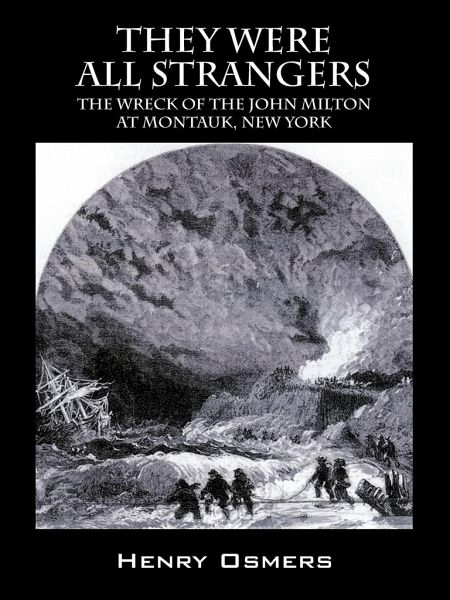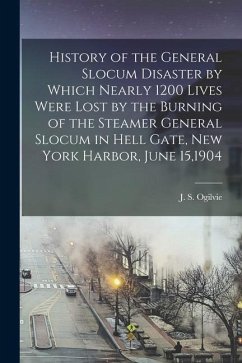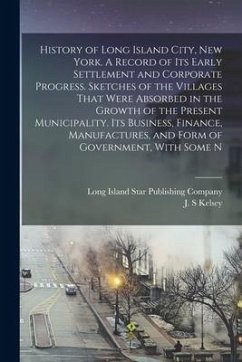
They Were All Strangers
The Wreck of the John Milton at Montauk, New York
Versandkostenfrei!
Versandfertig in 1-2 Wochen
14,99 €
inkl. MwSt.

PAYBACK Punkte
7 °P sammeln!
"Her crew were frozen in blocks of ice." Long Island has long been known as the place of untold numbers of disasters at sea, many ending tragically. Few afford the many accounts of individuals expressing their grief and compassion at the loss of humankind in such a disaster, especially when those lost were totally unknown to them. "They Were All Strangers: The Wreck of the John Milton at Montauk, New York" captures the dismal drama of a nineteenth century shipwreck - the heartbreak, horror, and sometimes lurid fascination. Described as "one of the most beautiful vessels afloat", the John Milto...
"Her crew were frozen in blocks of ice." Long Island has long been known as the place of untold numbers of disasters at sea, many ending tragically. Few afford the many accounts of individuals expressing their grief and compassion at the loss of humankind in such a disaster, especially when those lost were totally unknown to them. "They Were All Strangers: The Wreck of the John Milton at Montauk, New York" captures the dismal drama of a nineteenth century shipwreck - the heartbreak, horror, and sometimes lurid fascination. Described as "one of the most beautiful vessels afloat", the John Milton, a medium clipper ship, set sail from its home port of New Bedford, Massachusetts early in 1855 to make long, arduous journeys around Cape Horn, South America, carrying an array of goods, and loads of gold-hungry prospectors from Long Island, New York and elsewhere to San Francisco in the mid 1850s. Upon landing, crew and passengers abandoned ship and set sail for the California hills in search of the illusive precious metal. Consequently, a new crew was assembled for the John Milton, cargo loaded, and the journey home began. The John Milton had a short sea life of only three years, ending with its crash onto the unforgiving, treacherous rocks along the shores of lonely, windswept Montauk on eastern Long Island during a raging snowstorm in February 1858, carrying thirty-three men, including 44-year-old captain Ephraim Harding, to their deaths. Approximately two thirds of the bodies were recovered and carried over snow-covered trails nearly twenty miles to East Hampton where they received a dignified funeral at the Presbyterian Church, followed by burial in the nearby Old South End Burial Ground. Though these men were totally unknown to the people of East Hampton, residents reached out with sincere emotion and sympathy, as evidenced by the many wagonloads of mourners that came from the neighboring communities of Sag Harbor, Amagansett and Bridgehampton to show their support. Among them were a number of "so large a number of old salts to pay respect to their deceased ship-mates." Women weeped from the windows of their homes as the coffins were carried from the church on that cold February day to their final resting place. The willingness of eastern Long Islanders to raise funds to construct a noble marble obelisk atop the gravesite is further evidence of their compassion for those lost souls. The bodies of Captain Harding and his 15-year-old son Rodolphus who accomopanied him on the fateful final journey were transported to Vineyard Haven on Martha's Vineyard for interment. Today, more than 150 years after the disaster of the John Milton, the details of this event have been assembled in book form, affording a glimpse into the harsh realities of travel on the high seas. It speaks of the Reverend Stephen Mershon of East Hampton, who captured the essence of the moment, beginning the funeral service with a quote from the Book of Job in the Bible: "Terrors take hold on him as waters; a tempest stealeth him away in the night. The east wind carrieth him away, and he departeth; and as a storm hurleth him out of his place." It portrays in words the heartbreak felt by residents from Long Island to Martha's Vineyard over the loss of these brave young men. The story of the John Milton has a permanent place in the annals of Long Island's maritime history.





![In Richest Alaska and the Gold Fields of the Klondike [microform]: How They Were Found, How Worked, What Fortunes Have Been Made, the Extent and Richn Cover In Richest Alaska and the Gold Fields of the Klondike [microform]: How They Were Found, How Worked, What Fortunes Have Been Made, the Extent and Richn](https://bilder.buecher.de/produkte/65/65557/65557976n.jpg)






